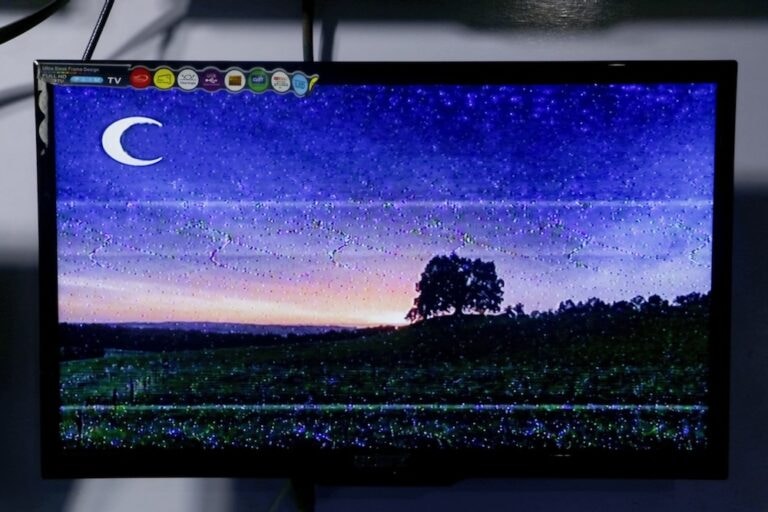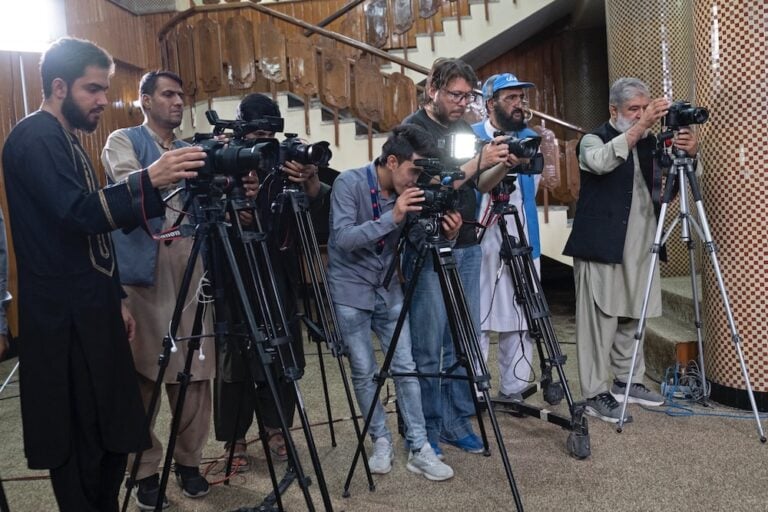The violence that threatens journalists has created a climate that does not favour free and impartial coverage of the upcoming presidential election, warns RSF.
(RSF/IFEX) – The violence that threatens journalists working for Afghanistan’s news media has created a climate that does not favour free and impartial coverage of the 20 August 2009 presidential election, Reporters Without Borders said.
Media coverage is also affected by the fact that political obstruction has prevented the adoption of a new press law, a situation that Reporters Without Borders already deplored in its March report on a fact-finding visit to Afghanistan and its letter to the presidential candidates on 31 July.
“One of the consequences of the failure to adopt the new press law has been unequal air-time for the candidates,” the press freedom organisation said. “Voters have also been denied independent coverage on national television throughout the campaign. Even if the monitoring carried out by the Electoral Media Commission is a big step forward, it is not enough. Journalists need laws that guarantee their safety and freedom, at least in principle.”
Reporters Without Borders added: “This campaign has underscored the need for the next government to decriminalise press offences and pass legislation that improves the pay and contract situation for journalists so that Afghanistan can have a free press. It must also end impunity for those who commit acts of violence against the media, especially women journalists. Such violence by officials and security forces has repeatedly been denounced. It must cease without delay or women will stop working in the media.”
Media during election campaign
Around 30 candidates have been seeking radio and TV airtime and interviews since the start of the presidential election campaign on 16 June. Unequal access and manipulation of access pose a serious threat to the elections. Few of the candidates have sufficient funds to be able to broadcast regular campaign spots. Most of them have used TV only once or twice during the campaign and some have had to settle for just using wall posters.
Although independent TV stations and other independent media have tried to let the various parties participate in debates and interviews, the leading broadcasters have accorded most space to a limited number of candidates. According to Insight, a local NGO supported by the United Nations Development Programme that has been monitoring coverage of the elections, the TV stations have been favouring just a few candidates.
There are independent media in Afghanistan but they are in the minority. It is very common for media to be funded by political parties or foreign governments that dictate their political and religious agenda. This politicises and “ethnicises” independent media and severely reduces the quality of news and information.
Several “temporary” daily and weekly newspapers have reportedly been created that are not edited by professional journalists and are in fact just political tools being used by certain candidates solely for electoral ends.
Unfair media coverage
An independent body with five experienced members, the Electoral Media Commission was set up to ensure fair media coverage of the elections. Its president, Sediqullah Tauhidi, told Reporters Without Borders: “Overall, the media situation has been satisfactory during the election campaign. The media have had sufficient freedom to report the news and to make the public aware of the campaign. Privately-owned radio and TV stations have had a significant participation in the election coverage by means of various programmes, especially local radio stations, which have been very active. International media such as Radio Azadi and BBC Persian have actively covered the elections throughout the campaign.”
However, although most of the privately-owned media agreed to a good-conduct charter proposed by the Electoral Media Commission that called for equal coverage of the candidates in news programmes, in practice they have continued to favour one candidate or another in other kinds of programmes.
Tauhidi also voiced reservations about the state radio and TV broadcaster. “It has not performed its duties with impartiality and has instead displayed a clear support for the incumbent president even if, in certain regions such as Mazar-i-Sharif or Balkh, local branches of the state television have supported other candidates.”
Violence turns remote regions into news black holes
More than 3,000 Afghans are running for the 544 provincial councillor positions that are also up for election on 20 August. Although there have not so far been any serious incidents related to the elections, the situation continues to be tense in several provinces.
Saber Fahim, a member of the Nai media monitoring NGO, said: “Many journalists complain of lack of access to information in the provinces of Ghazni and Khost and in the south of the country.” Some journalists even claim that local officials have been ordered not to cooperate with the media.
Fewer and fewer journalist visit regions that are no longer controlled by the authorities, with the result that these regions have turned into news “black holes.” It is important to remember that the threats to Afghan and foreign journalists do not come solely from the Taliban. Although the Taliban are the main source of violence and press freedom violations, criminal groups are also often to blame.


